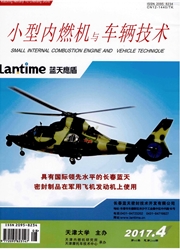

 中文摘要:
中文摘要:
为了研究在高原环境下排气再循环(EGR)与可变喷嘴涡轮增压(VNT)对柴油机性能,燃烧和排放的影响,在台架测试的基础上,应用GT-POWER软件,建立了带EGR与VNT系统的柴油机一维流动仿真模型,并进行了模拟计算与分析。研究表明,随着EGR率增加,柴油机有效燃油消耗率基本呈现增加的趋势。当VNT开度比较小时,有效燃油消耗率随EGR率增加的幅度也较低。最大缸内压力和最高缸内温度随着EGR率增加而降低。在EGR率相同时,最大缸压随着VNT开度增大而减小。NO_x排放随着EGR率的增大而逐渐降低,EGR率一定时,NOx排放随VNT开度的增大而逐渐降低。在不同工况下,随着EGR率增加,颗粒物排放呈现不同的变化趋势;当EGR率进一步增大时,颗粒物排放呈现增加的趋势。在相同EGR率时,颗粒物排放基本随VNT开度的减小逐渐降低。
 英文摘要:
英文摘要:
In order to study the effect of EGR and VNT on diesel engine performance, combustion and emission characteristics for plateau environment, one dimensional flow simulation model of diesel engine including EGR and VNT system was established based on bench testing using GT-POWER and numerical calculation and analysis were carried out. Results show that effective specific fuel consumption of diesel engine basically increases with the increase of EGR rate. When VNT open degree is relatively small,effective specific fuel consumption goes up slowly as EGR rate increases. Maximum cylinder pressure and temperature decrease with the increase of EGR rate. When EGR rate is constant, maximum cylinder pressure falls as VNT open degree goes up. Emission of NOxgradually decreases with the increase of EGR rate. And emission of NOxdecreases with the increase of VNT open degree when EGR rate remains constant. Particulate emissions of different operating conditions show different trends with the increase of EGR rate; Particulate emissions increase with a further increase of the EGR rate. Also, when EGR rate stays the same, particulate emissions basically fall with decrease of VNT open degree.
 同期刊论文项目
同期刊论文项目
 同项目期刊论文
同项目期刊论文
 期刊信息
期刊信息
